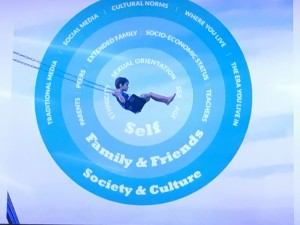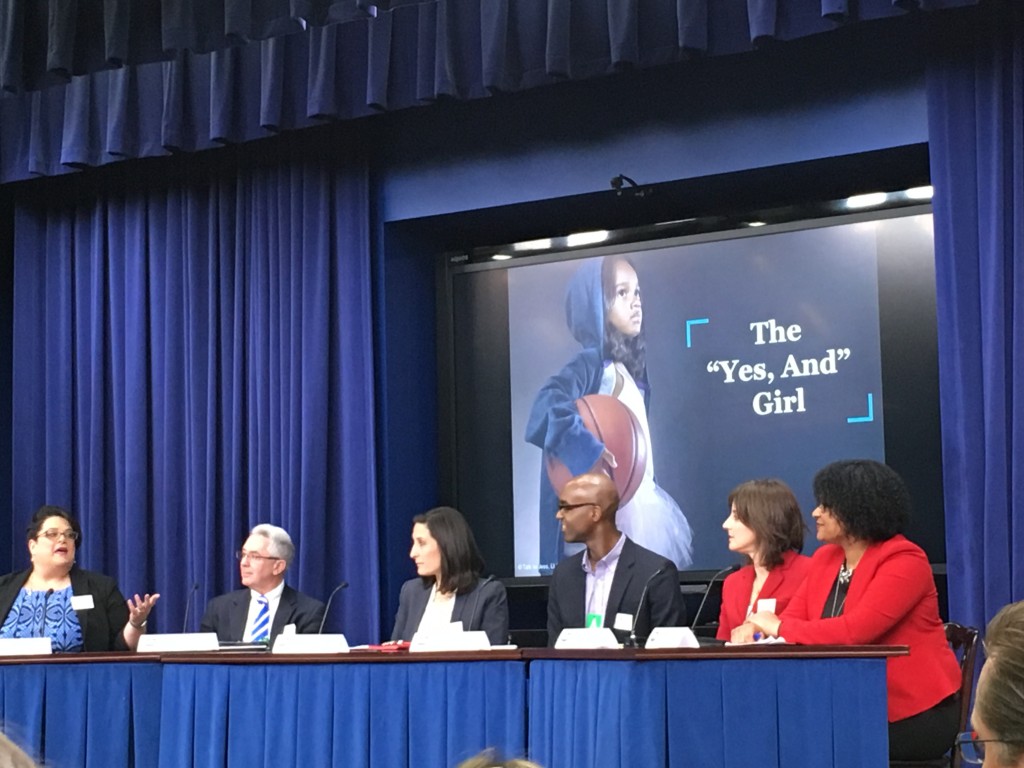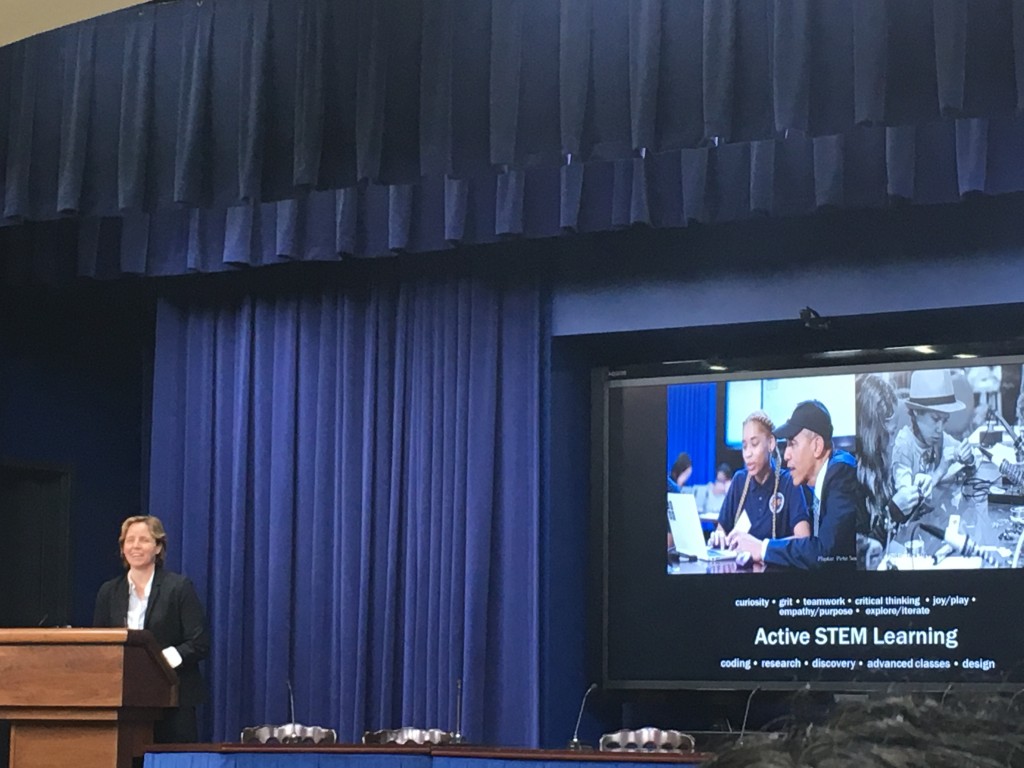April was a busy month at the White House. In addition to the Early STEM Learning Symposium (which Elisabeth McLure reported on last week), the White House also played host to a day-long conference, “Helping Children Explore, Learn, and Dream Without Limits: Breaking Down Gender Stereotypes in Media and Toys.”

See Children, Teens, Media and Body Image for more information
Organized by the White House Council on Women and Girls, the US Department of Education, and the Media, Diversity and Social Change Initiative at the University of Southern California, the conference brought together an impressive interdisciplinary mix of leading researchers, content creators, and advocates working in the area of children’s media. The researchers gave us an in-depth look at current research on how notions of boyhood, masculinity, and femininity are affecting children today and the impact of gender disparities in children’s media and toys. It was especially interesting to hear the results of the new Comprehensive Annenberg Report on Diversity (CARD) led by Dr. Stacy Smith, which examines the issue of inclusion on screen and behind the camera in works distributed by 10 major media companies; the report examined every speaking character across film, television, and digital content as well as the gender and race of directors, CEOs, and other employees.
The event also featured industry leaders from Mattel, Disney, Lego, and DC Entertainment/Warner Bros, as well as startups like littleBits. These were fascinating case studies of the ways that toy and media companies recognize the need to dissolve the pink/blue aisles and gender stereotyping in product design. And, finally, parent, blogger, and policy advocates of youth-serving organizations including Common Sense Media and Amy Poehler’s Smart Girls presented recommendations for developing more inclusive children’s media and toys that disrupt gender stereotypes.

One of the guiding forces behind the event was author, educator, and champion for girls empowerment Jess Weiner. From her pioneering work with Mattel as an advisor on Barbie’s latest body evolution to her role as ambassador of Dove’s Real Women campaign, she has advocated for partnering with the media that create the messaging that reaches girls. This was clearly was the underlying theme of the White House event: to go beyond the blaming and the shaming in order to bring an interdisciplinary mix of stakeholders invested in children’s media who recognize the impact that gender representations can have on girls’ social-emotional development, and the opportunities that breaking stereotypes can bring to girls’ lives as well as to businesses and the overall childen’s media industry. (Check out what she had to say about the event on her blog.)

The White House has been working with the media and entertainment industry to raise awareness about STEM careers, and has really made a push to raise awareness about the role of women in non-traditional careers. At the conference, Megan Smith, United States Chief Technology Officer, announced the Untold Stories in STEM series. The initiative invites women from across the Administration tell the stories of their personal heroes across the fields of science, technology, engineering, and math.
As Valerie Jarrett, Chair of the White House Council on Women and Girls, put it, “We are here to get rid of outdated notions of what boys and girls can and cannot do and to figure out how to create a space where a girl can think of herself as not just a pretty girl in a pretty dress but as a child for whom infinite potential lies ahead.”
Jarrett spoke eloquently about the lack of men in professions such as nursing and teaching, and the lack of women in STEM careers and its long term impact on our economy. She cited the “CSI Effect”, which demonstrates the impact that television media can have on altering perceptions of acceptable careers for men and women. In the early 2000s, the introduction of various fictional CSI crime shows which portrayed men and women in positive, dramatic forensic science roles spurred significant increases in forensic science program applications at universities, with undergraduate and graduate degree enrollment in these programs almost doubling from 2000 to 2005.
Just as targeted efforts by the entertainment community to enhance the profile of STEM jobs can influence young people’s career choices, Jarrett noted that targeted efforts by the children’s media industry to move past stereotypes can dramatically impact and improve young girls’ self-confidence, self-image, career choices, and social-emotional health.
I have been working in the field of children’s media and education since 1999. If I had to trace the roots of my career choice, I would return to the summer after my sophomore year of college in 1994 when I was an intern at Ms. Magazine and became fully aware of the intersections of gender, class, and race and the incredible way in which notions and representations of gender impact women’s lives in areas ranging from daily social interactions to economics. It was therefore a deeply powerful moment for me, then, to attend this conference where some of the leading women in the Obama administration—Stephanie Sprow, Deputy Director of First Lady Michelle Obama’s Reach Higher Initiative, Tina Tchen, Executive Director of the White House Council on Women and Girls, and Megan Smith, United States Chief Technology Officer—all took the stage to focus the nation’s attention on the impact that media depictions of gender can have on girls (and boys) during early childhood.
Stay tuned for part 2, which will give additional highlights of research and recommendations from the conference.
 Sandhya Nankani is the founder of Literary Safari, which curates, produces, and publishes quality content that celebrates literacy, global learning, diversity, including its award-winning children’s literacy and storytelling apps—Dentist Bird: A West African Folktale and HangArt. Born and raised in Ghana, India, and the United States, Sandhya is also a co-founder of the coalition Diversity in Apps, which is committed to raising awareness about the need for inclusive, equitable, and diverse children’s digital media and to highlighting best practices in the industry.
Sandhya Nankani is the founder of Literary Safari, which curates, produces, and publishes quality content that celebrates literacy, global learning, diversity, including its award-winning children’s literacy and storytelling apps—Dentist Bird: A West African Folktale and HangArt. Born and raised in Ghana, India, and the United States, Sandhya is also a co-founder of the coalition Diversity in Apps, which is committed to raising awareness about the need for inclusive, equitable, and diverse children’s digital media and to highlighting best practices in the industry.


